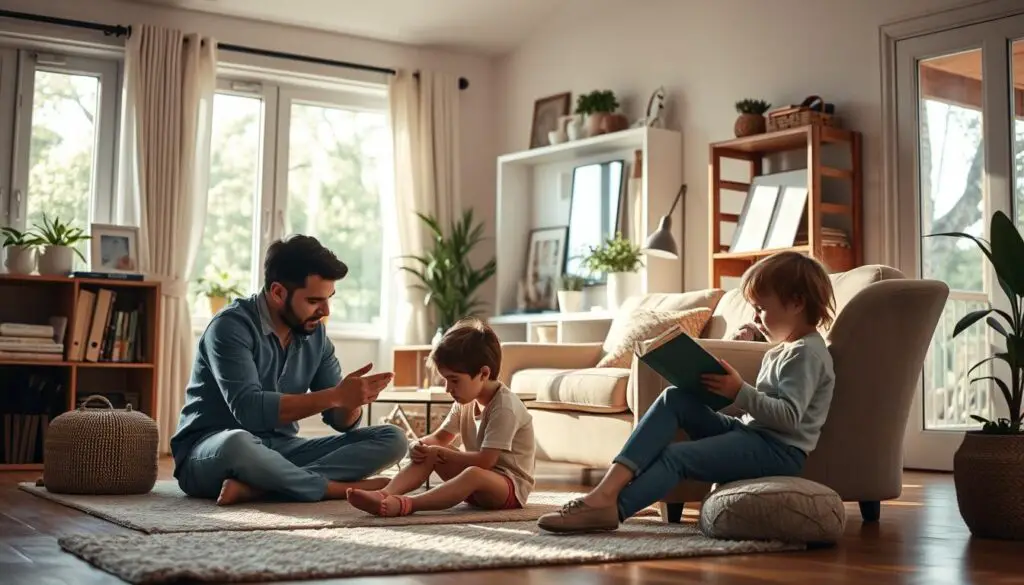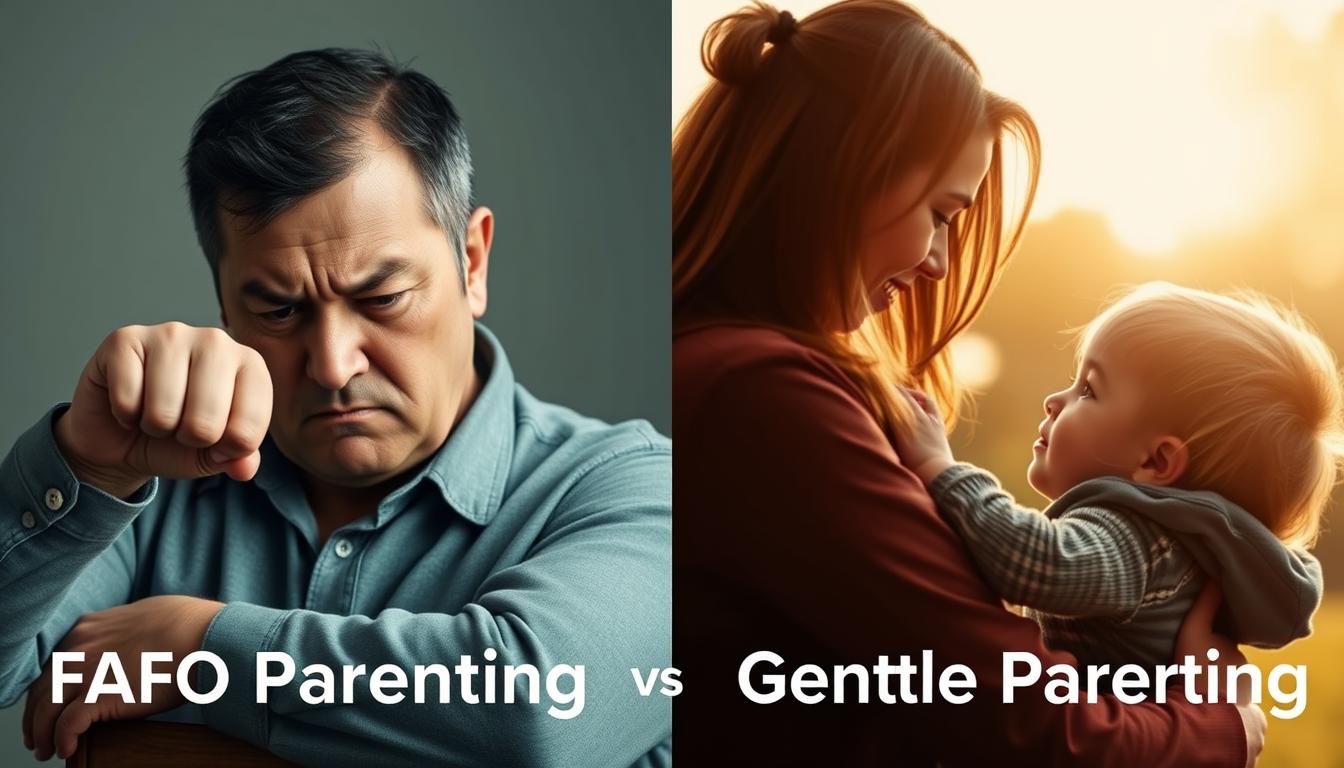Why Type C Parenting Might Be the Balance You’ve Been Looking For
As a parent, you’re likely no stranger to the challenges of finding the perfect balance in your parenting style. With the demands of modern life, it’s easy to feel torn between being organized and being flexible. According to Ashleigh Surratt, a social media creator who popularized the concept, Type C parenting offers a refreshing middle ground.
This approach combines the structure of Type A with the flexibility of Type B, creating a more realistic and adaptable way to raise your kids. By embracing this type of parenting, you can achieve a better balance in your life and spend quality time with your child.
Key Takeaways
- You’ll discover a balanced parenting approach that suits modern families.
- Learn how to achieve a balance between structure and emotional connection.
- Understand how to maintain important boundaries and routines while acknowledging the chaos of raising kids.
- Explore the concept of “organized chaos” in parenting.
- Find out how this approach can help you manage your time and life more effectively.
Understanding the Parenting Style Spectrum
Parenting is a complex journey, and recognizing the different approaches can help you find what works best for you and your child. The traditional parenting style spectrum is generally understood through the lens of Type A and Type B parenting approaches.
The Traditional Type A and Type B Parenting Approaches
Type A parents tend to be highly organized, schedule-oriented, and structured, often leaning towards authoritarian or strict authoritative parenting styles. They emphasize schedules, organization, and consistent routines, creating predictable environments for their children. On the other hand, Type B parents are more laid-back, go-with-the-flow, and often disorganized, aligning with permissive parenting styles. They prioritize flexibility, spontaneity, and a more relaxed approach to rules and household management.
The characteristics of Type A parenting include a focus on planning, punctuality, and clear expectations. In contrast, Type B parenting is marked by adaptability, a willingness to improvise, and a more lenient attitude towards rules.
Why Many Parents Don’t Fit Neatly Into Either Category
Many parents find themselves not fitting neatly into either the Type A or Type B category, especially as the realities of parenting challenge their natural tendencies. Some moms and parents may feel like they’re torn between wanting structure and embracing flexibility in their parenting journey. The way people were raised themselves often influences their parenting style, creating complex approaches that don’t fit neatly into single categories.
- You’ll gain a clear understanding of the traditional parenting style spectrum.
- Many parents use different approaches depending on the situation.
- Parenting styles are influenced by how people were raised.
By understanding the limitations of these traditional categories, you can begin to explore alternative approaches that better suit your needs and your child’s unique requirements.
What Exactly Is Type C Parenting?
As a parent, you’re likely searching for a style that blends the best of structure and flexibility. Type C parenting offers this balance, combining the strengths of different approaches to create a unique parenting style.

The Perfect Fusion of Structure and Flexibility
Type C parents are characterized by their ability to maintain balance in their parenting approach. They understand the importance of structure for their child’s emotional regulation, but also recognize that perfection isn’t healthy. For instance, a Type C mom might establish a bedtime routine that includes lullabies and stories, yet remain flexible enough to let her kids crawl into bed with her after a tough day.
This approach is built on “high standards and realistic expectations,” a phrase coined by therapist Cheryl Groskopf. It’s about maintaining important boundaries and routines, like consistent bedtimes, while allowing flexibility in less critical areas. This balance creates a sense of stability and emotional safety for children.
- Maintaining structure in key areas
- Allowing flexibility in less critical areas
- Embracing “organized chaos“
Origins of the Type C Parenting Concept
The concept of Type C parenting gained popularity through social media, particularly through creator Ashleigh Surratt’s video content depicting the reality of being a parent who values organization but accepts the inevitable chaos of family life. As parents recognized themselves in this “middle path” approach, the concept resonated widely.
Type C parenting emerged naturally as parents adapted their ideals to the realities of family life and the demands on their time. It represents a shift towards a more realistic and flexible approach to parenting, one that acknowledges the complexities of modern family dynamics.
Characteristics of Type C Parents
As a Type C parent, you’ll find that your approach to parenting is a dynamic mix of planning and flexibility. This unique blend allows you to navigate the challenges of parenting with both structure and emotional responsiveness.
Organized Chaos: The Hallmark of Type C Parenting
Type C parents exhibit a blend of intentional structure and emotional flexibility. They maintain organization in specific areas, such as categorizing toys by type, while accepting disorder in others, like leaving breakfast dishes on the table until afternoon.
Non-Negotiables vs. Flexible Areas
These parents clearly distinguish between non-negotiable rules, such as consistent bedtimes or safety protocols, and areas where flexibility is acceptable. For instance, while bedtime might be strictly at 8 p.m., the choice of pajamas might be more relaxed, especially if laundry is still in the dryer.
The Balance Between High Standards and Realistic Expectations
Type C parents strive to maintain high standards for important values while having realistic expectations about implementation. They might use color-coded calendars to stay organized but won’t be too hard on themselves when the day doesn’t go exactly as planned.
| Aspect | Type C Parenting Approach | Example |
|---|---|---|
| Organization | Intentional structure in specific areas | Categorizing toys by type |
| Flexibility | Emotional responsiveness and adaptability | Leaving breakfast dishes until afternoon |
| Non-Negotiables | Clear rules for important values | Consistent bedtimes |
| Flexible Areas | Acceptance of flexibility in less critical areas | Pajama choice on bedtime |
As one Type C mom described it, “I’m aggressively competent, but also emotionally exhausted. Type C moms are just out here trying to hold it together with a hair tie, three alarms set in their phones, and some trauma response.” This quote encapsulates the essence of Type C parenting: a blend of competence and emotional resilience.
Why Type C Parenting Might Be the Balance You’ve Been Looking For
As you navigate the complexities of parenting, you might find that Type C parenting offers the equilibrium you’ve been seeking. This approach combines the best elements of different parenting styles to create a balanced and sustainable method. By embracing Type C parenting, you can provide your children with the security and flexibility they need to thrive.
Benefits for Children’s Emotional Development
Type C parenting teaches children that being human is okay and that love and connection matter more than perfection. This approach gives kids both the security of structure and the warmth of flexibility, allowing them to develop emotional regulation and adaptability. As a result, children raised with Type C parenting tend to be more resilient and emotionally intelligent.
The combination of consistent boundaries and flexibility helps children understand that making mistakes is an essential part of the learning process. This fosters healthy self-esteem and encourages kids to take risks and explore their surroundings. By adopting Type C parenting, you can help your children develop a positive self-image and a growth mindset.
| Benefits for Children | Description |
|---|---|
| Emotional Regulation | Children learn to manage their emotions through consistent boundaries and flexibility. |
| Adaptability | Kids develop the ability to adapt to different situations and challenges. |
| Resilience | Children become more resilient as they learn to cope with mistakes and setbacks. |

Advantages for Parents’ Mental Well-being
Type C parenting is not only beneficial for children; it also offers numerous advantages for parents. By adopting this approach, parents can maintain important standards without the burnout that comes from striving for perfection in every area. This leads to a more sustainable and enjoyable parenting experience.
According to therapist Lisa Franks, Type C parenting feels “real and sustainable” for many parents. It allows parents to let go of certain pressures while still providing consistency for their children. This approach is particularly beneficial for working moms, neurodivergent moms, or moms healing from perfectionism.
By embracing Type C parenting, you can reduce guilt, enjoy more sustainable parenting practices, and achieve a better work-life balance. This, in turn, strengthens the parent-child bond and creates a more positive family environment.
Practical Examples of Type C Parenting in Action
As a Type C parent, you’re likely to implement balanced approaches in your daily routines and interactions with your children. This parenting style is not just theoretical; it’s a practical way of managing the chaos of family life while maintaining love and structure.
Daily Routines with Flexibility
Type C parents understand the importance of daily routines for their children. They establish consistent bedtime routines that include calming activities like lullabies and stories, but also allow for flexibility when unexpected situations arise. For instance, while bedtime is set at 8 p.m., they might adjust it slightly on special occasions or when the child is particularly restless.
Firm yet Understanding Discipline
When it comes to discipline, Type C parents maintain firm boundaries on important values while being understanding of normal developmental challenges. According to therapist Cheryl Groskopf, “Think of it as a mix of intentional structure and emotional flexibility—which, by the way, is basically the holy grail of good-enough parenting. Not perfect, not laissez-faire—just good enough to raise healthy, self-trusting humans.”
Scheduled Spontaneity in Family Time
Type C parents also prioritize family time, scheduling it into their busy lives while leaving room for spontaneity. This approach allows for both planned activities and unexpected adventures, making family time enjoyable and stress-free. For example, they might plan a weekly game night but be open to changing plans if the kids suggest an impromptu outdoor activity.
| Aspect | Type C Parenting Approach | Benefits |
|---|---|---|
| Daily Routines | Structured with flexibility | Provides stability while adapting to changing needs |
| Discipline | Firm on values, understanding of developmental stages | Teaches responsibility and empathy |
| Family Time | Scheduled with room for spontaneity | Encourages bonding and creates lasting memories |
By embracing Type C parenting, you can create a balanced and nurturing environment that supports the overall well-being of your children and strengthens your family bonds.
Conclusion: Embracing the Middle Path in Parenting
For many parents, Type C Parenting represents a sustainable approach that combines the best of different parenting styles. This balanced method allows both parents and children to be human, make mistakes, and prioritize connection over perfection. By embracing Type C Parenting, you’ll gain a clear understanding of how it offers a long-term, balanced approach for your family.
The key benefits of this middle path include combining structure with flexibility and high standards with realistic expectations. As you adopt this approach, you’ll be encouraged to prioritize connection and emotional health over perfectionism. Type C Parenting prepares children for the real world by teaching both structure and adaptability, ultimately raising emotionally healthy, capable children who feel secure and free to be themselves.
As you navigate your parenting journey, trust your instincts and find the balance that works for your unique family situation. With Type C Parenting, you’ll be well on your way to creating a loving and supportive environment where your children can thrive.
FAQ
What is Type C Parenting and how does it differ from other parenting styles?
Type C Parenting is a balanced approach that combines structure and flexibility, differing from traditional Type A and Type B parenting methods, which often lean towards being overly strict or too permissive.
How can Type C Parenting benefit my child’s emotional development?
By providing a balance between high standards and realistic expectations, Type C Parenting helps children develop emotional intelligence, self-regulation skills, and a sense of responsibility.
Will adopting Type C Parenting reduce the chaos at home?
Type C Parenting doesn’t eliminate chaos entirely, but it helps create a more organized and manageable environment by setting non-negotiables while allowing for flexibility in other areas.
How do Type C Parents handle discipline?
Type C Parents use a firm but understanding approach to discipline, setting clear boundaries while being empathetic and open to their child’s perspective.
Can Type C Parenting work for families with multiple children?
Yes, Type C Parenting can be effective for families with multiple children, as it allows for flexibility and adaptability in responding to the unique needs of each child.
How can I start implementing Type C Parenting in my daily routine?
Begin by establishing a balance between structured routines and flexible time, and be willing to adjust your approach as needed to suit your family’s lifestyle and needs.








